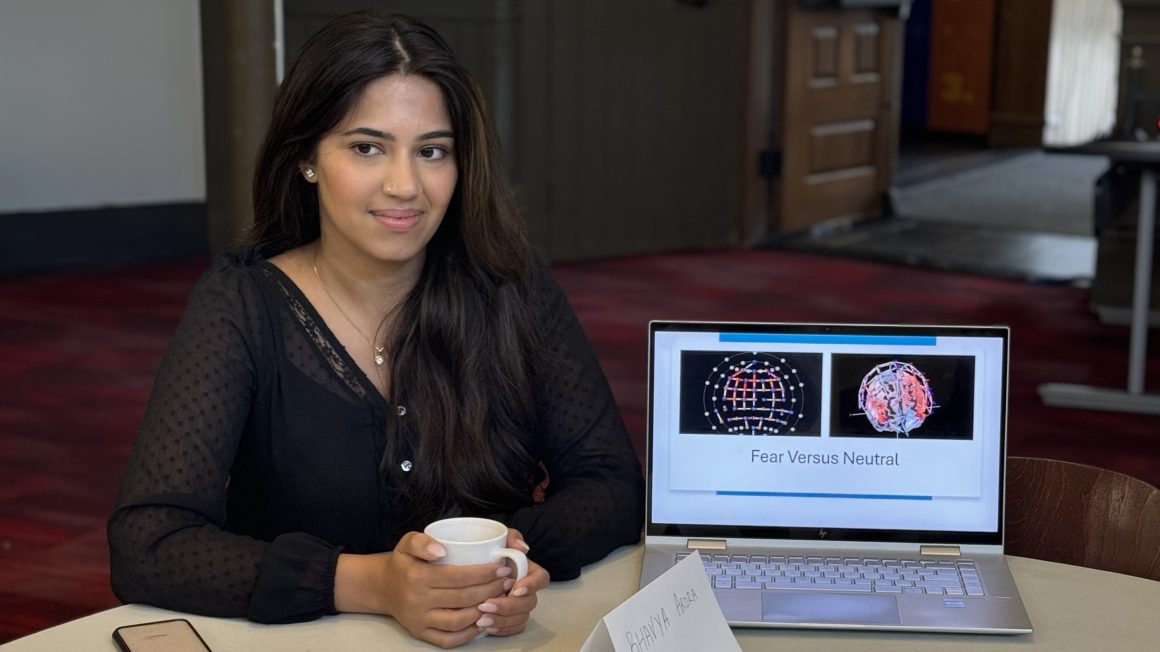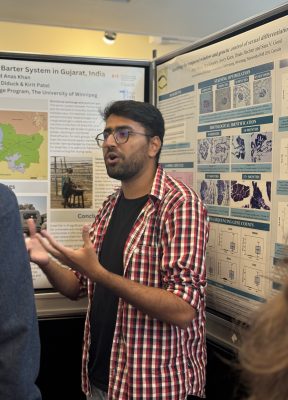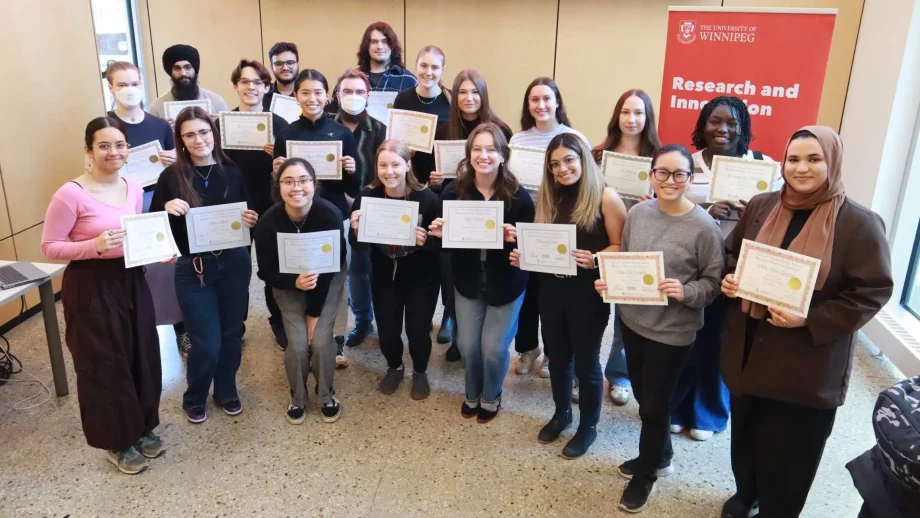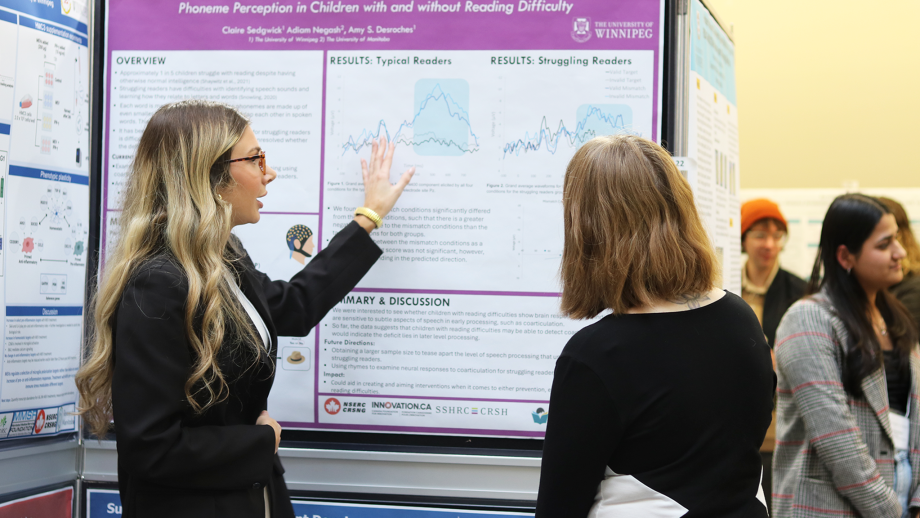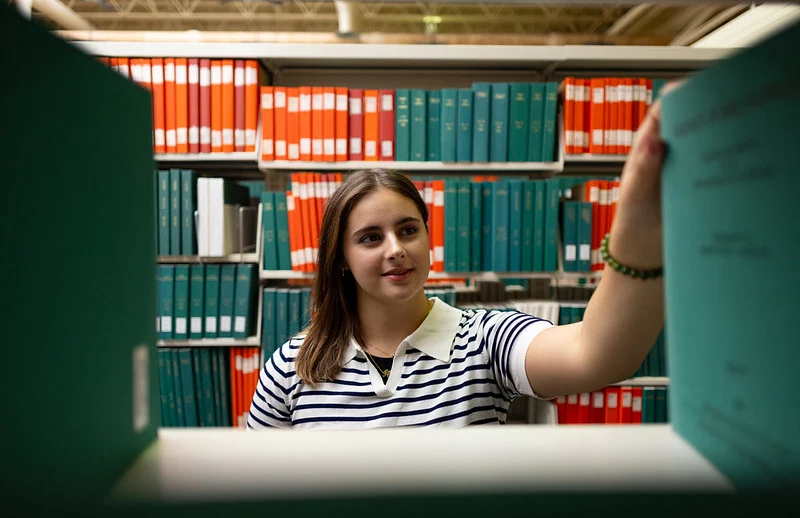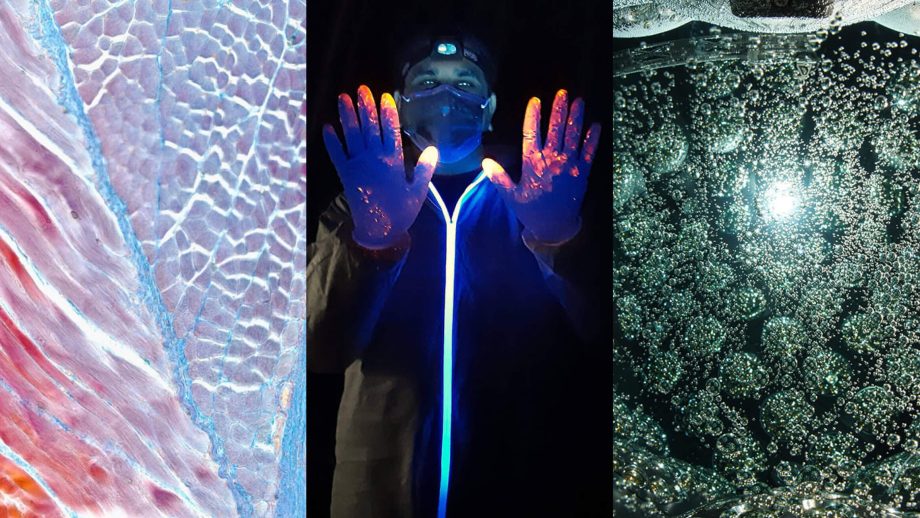University of Winnipeg students who received research awards for the 2024-25 school year were invited to share their research, network, and celebrate their success at the 2024 Student Research Awards Luncheon in August.
“It was truly inspiring to witness the passion students brought to this event,” said Dr. Jitendra Paliwal, Vice-President, Research and Innovation. “The energy and enthusiasm in the room highlighted the bright future of innovation and discovery at The University of Winnipeg.”
The event featured a keynote lecture by Dr. Sanoji Wijenayake. Students engaged in discussions about their research projects with fellow award recipients and UWinnipeg faculty members. They also had the option to prepare a research poster for their presentation.
Bhavya Arora
Bhavya Arora graduated from UWinnipeg in the spring of 2024 with an Honours in Psychology. She received a Natural Sciences and Engineering Research Council (NSERC) Undergraduate Student Research Award (USRA) to conduct research, under the supervision of Dr. Stephen Smith, that looks at brain activity during emotional perception.
It was really amazing to meet a lot of talented and brilliant people in the room, and to see how there are so many types of research happening at UWinnipeg.
Bhavya Arora
“When we show participants different emotional stimuli, for example, some images were scary and some were neutral, some were happy or disgusting,” Arora said. “We see how the brain functions based on the images that they’re seeing.”
Arora said the USRA gave her and her research partner, Bronte Brenneman, the chance to learn how to operate a Functional near-infrared spectroscopy (fNIRS) machine and to better understand how much goes into the research process.
“I feel privileged to have received this award,” she said. “When you receive it, you feel like you can really apply your textbook learning to a lab setting and actually really understand what you’ve learned throughout these years. It’s really exciting.”
The Student Research Awards Luncheon, Arora said, was a welcome exercise in community-building.
“It was really amazing to meet a lot of talented and brilliant people in the room, and to see how there are so many types of research happening at UWinnipeg,” she said. “To see so many people also wanting to pursue their passion for research is inspiring.”
Arora is now in her first year of a Masters in Clinical Psychology at the University of Manitoba. Her goal is to conduct research on diverse groups and advocate for underrepresented voices in academia.
“My research will be looking at prenatal and postpartum mental health challenges in women, but from a cultural lens,” she said. “I’ve realized through the process of being an undergrad that a lot of research is really focused on a very homogeneous sample, and there’s not a lot of diversity in academia. I’m really excited to contribute to women’s mental health from a cultural lens.”
Mohammad Anas Shoebullah Khan
Mohammad Anas Shoebullah Khan will graduate from UWinnipeg this fall, with a Master’s in Environmental and Social Change. He received a Graduate Student Research Award (GSRA) for his research on the dried fish barter system between coastal and forest dwelling communities in Gujarat, India.
“I’m looking at social, nutritional, and cultural implications of the historical trade and barter relationships in the dried fish economy in Gujarat,” he said. “Dried fish is an important source of nutrition for some of the most marginalized people in south and southeast Asia. It also has cultural and social value for people and communities engaged in its processing, trade, and consumption. However, little is known about these informal economies in academic or policy discourse.”
Khan said the GSRA will help him build on his thesis work to better understand how these historical barter and trade relationships may affect regional nutrition security, health, and human rights.
“Each year during the crop harvest season, the Adivasi communities, living in forested hinterlands, travel to the coast to exchange their harvested crops for dried fish from the coastal fishing communities,” he said.
“This historical barter system has been there since time immemorial and it has endured till date. My research focuses on bringing to light the social, cultural, economic and nutritional significance of this barter system.”
“The award was crucial to fund that research,” Khan added. “I am very grateful for the community at UWinnipeg in terms of them acknowledging and appreciating my research as an international student.”
Khan said he was excited to talk about his research, and to learn about other students’ work at the Student Research Awards Luncheon.
“It’s mind-boggling, to be honest, the spectrum of research that is being conducted at UWinnipeg,” he said. “It makes me humble just thinking about how the world is so complex.”
The luncheon also helped Khan build connections with students in other disciplines.
“I had the opportunity to network with a couple of people to see if we could find possible connections in a way that we can work together,” he said. “It was also a space for celebration. People have been involved in their labs, in their field research all this time. It’s always good to get back to the campus and talk to people.”
The University of Winnipeg has a proud history of training outstanding undergraduate and graduate students. To learn more about student research award opportunities, please visit the Research Office’s Student Research Funding webpage.

